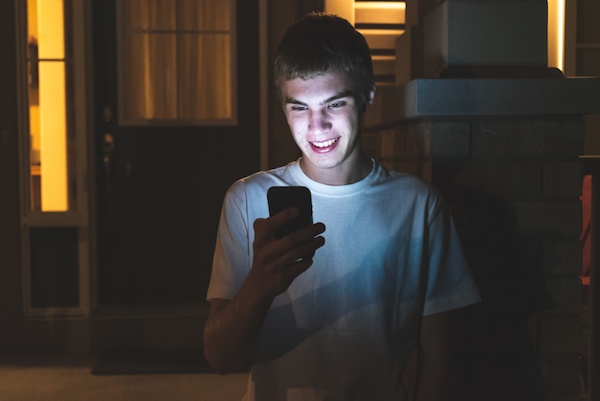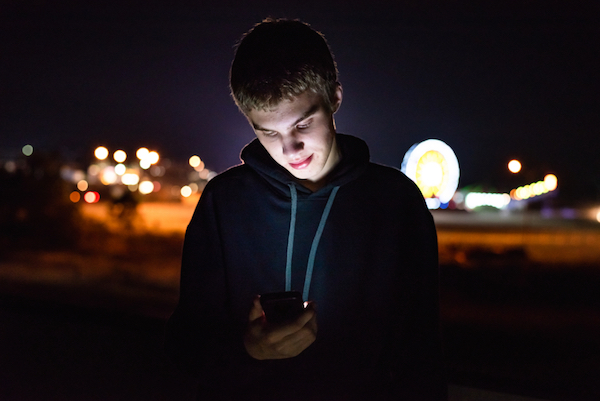What’s an inappropriate text or image?
The Internet is one of the most useful tools we have in the modern world and if you use it the right way, it’s usually pretty safe. Unfortunately, some people use the Internet in ways that make others (including kids) feel really uncomfortable. They might send rude photos or hurtful messages. They might pretend to be somebody they’re not. For example, they might chat with you for a while and send a photo of themselves that shows a 13-year-old girl – but you don’t realise the actual person you’re talking to is a 45-year-old man trying to fool you.
That’s why it’s so important to be careful about who you interact with online and to be cautious and responsible when it comes to sharing photos, videos, text messages and social media posts with others. Talk to your parents so you know exactly what to do if you ever receive a rude picture or a message that makes you feel sad, embarrassed, shocked or uncomfortable in any way.
Your parents or teacher won’t mind if you’ve made an honest mistake and clicked on something you shouldn’t have – they just want to make sure you’re safe and that you feel okay to talk to them about these kinds of situations.
It is not appropriate (and can be dangerous) to share certain types of things online – even with your closest friends. These include:
- Naked photos or videos
- Photos or videos where people are doing rude things (pornography)
- Texts or messages that are rude or sexual (‘sexting’)
- Online messages that make fun or say degrading things about someone’s appearance, race or religion or talk about whether they’re ‘gay’
It’s also important to know that in the UK it’s illegal to take, to have or to send sexually explicit photos of children – even if the person doing this is a child themselves and is taking their own picture. ‘Sexting’ is illegal when those involved are underage. Sometimes the police can become involved.
How to stay safe from inappropriate Internet content:
- If you see anything online that makes you uncomfortable or unsure, close the app, page or message immediately and tell a trusted adult about it
- Never respond to rude messages, emails, photos or videos
- Get your parents to help you block people who send you nasty stuff
- Don’t open emails from people or organisations you don’t know
- Be honest with your parents about inappropriate content – it can be embarrassing to talk about but they need to know so they can help. If you’re too scared to tell your parents and need to talk to someone about rude content you’ve sent, received or seen the you can get help from another trusted adult or ring the Kids Helpline on 1800 55 1800 (you can call at any time and it’s free)
What is ‘sexting’ and why is it such a problem?
The word ‘sexting’ mixes ‘sex’ and ‘texting’ but it’s not limited to text messages – it’s when rude, sexual or inappropriate content is shared online. Sexting can happen through emails, SMS chat, social media posts, photos, videos, gaming platforms and more. Apps that allow for easy or anonymous sharing of photos are fertile ground for inappropriate content shared between teens. Quite often, there’s peer pressure involved – the old ‘everyone else is doing it’ excuse.
Posting something on the Internet is simple but realising you’ve made a terrible mistake and trying to get that rude content removed is MUCH harder. What may have seemed like a funny joke at the time (or something you thought was private) can seem very unfunny or not private at all when it goes viral and it’s out there for the world to see.
A classic example is when your boyfriend or girlfriend asks you to send a rude photo of themselves or to write you a super-intimate text message. You may think the recipient is the only person who will ever see it. But what happens when you break up? They might spread that content all over the Internet – it happens all the time.
And did you know it’s illegal for people under the age of 18 to engage in ‘sexting’ in the UK (sending, receiving or viewing a ‘sext’)?
Teenagers ‘sext’ for all kinds of reasons: as a joke, as a dare, to flirt, as proof of commitment to a relationship, to bully or humiliate others (like when locker room photos are taken without someone’s knowledge) or as a ‘trophy’ to show off to their peers. They may be pressured into it (approval-seeking).
Here are some important things to remember about ‘sexting’:
- Privately shared photos are never really private. They can easily be shared, even if you’re using apps that promise they’ll be removed after a short time.
- Deleting a photo or message doesn’t guarantee it hasn’t already been downloaded, copied or shared – everything you post online leaves a digital footprint
- Before you send a photo or rude text, imagine how you’d feel if your entire school (or your parents) saw it – because they could, even if you’ve been ‘careful’
- Sexting can have serious social and legal consequences – is it really worth getting into major trouble for?
- Sexting is never harmless and can lead to blackmail and bullying
If you find yourself in trouble with a ‘sexting’ situation that’s stressing you out and don’t know where to turn, your parents may be able to help – you just have to get over your embarrassment enough to let them know.
What can you do if your child has an issue with ‘sexting’?
‘Sexting’ isn’t going away anytime soon and it can be emotionally difficult for your child or teen to deal with whether they’re sending, receiving or looking at inappropriate images or messages online. They may not fully appreciate the dangers or potential consequences and will be counting on you for support and effective prevention and coping strategies. They may also be acutely embarrassed to bring the matter to your attention, so keep an open mind and provide non-judgemental help when they ask for it – because it’s not always easy for them to do that.
Sexting involves the sharing of sexually explicit or inappropriate content on digital devices. Young people do it for all kinds of reasons: peer pressure, desire for approval, flirtation, to bully or control others, etc. Today’s apps make it easy for kids to communicate in an instant and quite often, they have no idea how much trouble they can get into by sharing something rude or inappropriate. They may not even be aware that sexting is illegal in the UK for those under the age of 18.
Your best approach to talking with your kids about sexting is to encourage open dialogue. You want them to be more likely to talk to you about it than hide what they’re experiencing. Listen – don’t judge. Find out where their heads are at when it comes to what they and their friends are sharing online. Encourage them to think about the consequences and stress how hard it is to ‘take back’ a nasty message or rude photo once they’ve pressed that SEND or SHARE button.
If your child is receiving inappropriate content, you may need to use some kind of parental control on their devices. Explain what is okay to share online and what isn’t (personal holiday plans, their address, certain types of photos/videos, etc.). Warn them about online predators and what can happen if explicit content ends up in the wrong hands. If you feel it’s necessary, monitor your child’s activities on social networking sites.
If you discover your child has become involved in sexting, you can ask the Internet Watch Foundation to search for explicit videos or photos of your child to try and remove them. Find out who your child sent the material to and if they believe it’s been shared with others. If an adult asked them to send an illicit image, this is known as ‘online grooming’ and is against the law, so contact the CEOP (Child Exploitation and Online Protection Centre) for advice. You should also report the offensive content to the relevant social media platform if applicable – Net Aware is a great information source on how to keep kids safe on social networking sites. If the situation is school-related, contact the child’s school to see if they can help – most schools have policies and procedures in place to handle these kinds of issues.





